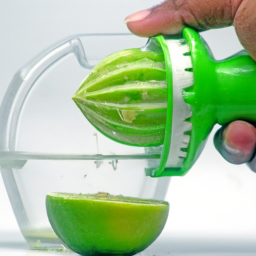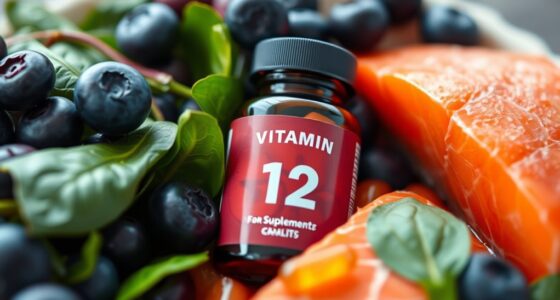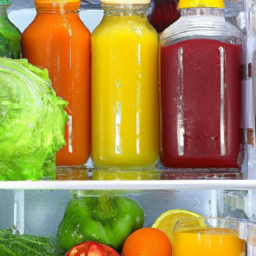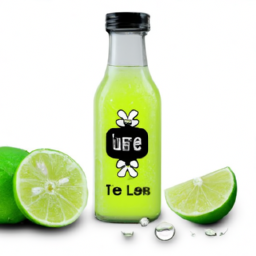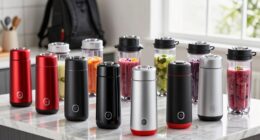I had an epiphany while making a lemon cake – I realized I was uncertain about how much lemon juice to use.
I frantically searched the internet for answers, but found conflicting information.
This led me down a rabbit hole of research on the topic of how much lemon juice is in one lemon.
Lemons are a staple in many kitchens, used for everything from adding flavor to drinks and dishes, to providing acidity for baked goods.
But without a clear understanding of how much juice is in one lemon, it can be difficult to achieve the desired taste in your recipes.
In this article, I will share with you the science behind lemon juice, the factors that affect the amount of juice in a lemon, and tips for measuring and getting the most juice out of your lemons.
So let’s dive in and become lemon juice experts!
Key Takeaways
- On average, one lemon yields 2-3 tablespoons of juice.
- Rolling the lemon can result in more juice.
- Measuring accurately can be done using a juicer or squeezer.
- Storing freshly squeezed lemon juice in an airtight container in the fridge can help maintain its optimal flavor and quality.
Understanding the Importance of Lemon Juice in Cooking and Baking
You’ll want to keep in mind the crucial role that lemon juice plays in both cooking and baking, so it’s important to understand exactly how much juice you can expect from a single lemon. Using fresh lemon juice in your recipes not only adds a zesty flavor, but it also helps to balance out other flavors, tenderize meats, and prevent browning in fruits and vegetables. Additionally, lemon juice is a natural preservative that can extend the shelf life of certain foods.
While using fresh lemon juice is preferred, there are alternatives that can be used in a pinch. Bottled lemon juice can be used in place of fresh lemon juice, but its flavor may not be as vibrant. Vinegar can also be used as a substitute for lemon juice in certain recipes. However, it’s important to note that these substitutes may not provide the same benefits as using fresh lemon juice.
When it comes to determining how much juice you can get from a single lemon, there are several factors that can affect the amount. These factors include the size and ripeness of the lemon, the temperature of the lemon, and the method used to extract the juice.
Let’s take a closer look at each of these factors and how they impact the amount of juice you can get from a lemon.
Factors that Affect the Amount of Juice in a Lemon
When I’m cooking or baking with lemon, I always make sure to consider the size and ripeness of the lemon. These two factors can greatly affect how much juice you can extract from a lemon.
Larger lemons tend to have more juice, while riper lemons are easier to squeeze and yield more juice. It’s important to keep these factors in mind to ensure you’re getting the most out of your lemons in the kitchen.
Size of the Lemon
The size of a lemon can greatly affect how much juice it yields. Here are three factors that come into play when it comes to lemon size variations and juicing techniques:
- Larger lemons tend to have more juice than smaller ones.
- The thickness of the lemon’s skin can also impact the amount of juice it yields. Thinner-skinned lemons are easier to juice and tend to yield more juice than thicker-skinned ones.
- The juicing technique used can also make a difference. Rolling the lemon on a hard surface before juicing can help break down the membranes inside the fruit, resulting in more juice.
When it comes to juicing a lemon, it’s important to pay attention to its size and adjust your technique accordingly. However, lemon size is not the only factor that affects the amount of juice a lemon produces. The ripeness of the lemon also plays a crucial role, which we’ll explore in the next section.
Ripeness of the Lemon
Ripe lemons are crucial for optimal juicing, as they tend to yield a higher amount of tangy, citrusy goodness. When it comes to ripeness variations, there are a few things to keep in mind.
The first is that lemons that are too ripe may have a higher acidity level, which can result in a more bitter taste. On the other hand, lemons that are not quite ripe enough may not yield as much juice and can have a less intense flavor.
To determine the ripeness of a lemon, gently squeeze it in the palm of your hand. A ripe lemon should have a slight give, but not be too soft or mushy. Additionally, the skin should be smooth and free of blemishes.
By selecting the right ripeness level, you can ensure that you get the most juice out of each lemon and that the flavor is perfectly balanced.
Now, let’s move on to the next section and discuss how much juice you can expect to get from a single lemon.
Average Amount of Juice in One Lemon
Did you know that on average, one lemon yields about 2-3 tablespoons of juice? This amount can vary depending on the size and ripeness of the lemon, as well as the method used for lemon juice extraction. However, this is a good estimate to keep in mind when using lemon juice in recipes or for its many health benefits.
Lemon juice is a great source of vitamin C and antioxidants, and it’s been shown to aid in digestion, boost the immune system, and even improve skin health. It’s no wonder that many people incorporate lemon juice into their daily routine.
Knowing the average amount of juice in one lemon can help ensure that you’re getting the right amount of this beneficial ingredient in your diet. Now, let’s move on to measuring lemon juice and how to get the most out of your lemons.
Measuring Lemon Juice
Measuring the amount of tangy liquid extracted from a lemon is like trying to catch a handful of sand – it can be difficult to get an exact measurement, but there are a few tricks to get as close as possible.
One way to measure lemon juice is to use a juicer or lemon squeezer. These tools help to extract the maximum amount of juice possible and also provide a more accurate measurement.
Here are a few additional tips to ensure measuring accuracy when using a lemon squeezer:
- Cut the lemon in half and place it cut side down in the squeezer.
- Apply firm pressure to the handles to extract all the juice.
- Use a measuring cup to catch the juice as it comes out.
- Repeat the process with the other half of the lemon if needed.
Now that we know how to measure lemon juice, the next step is to learn how to get the most juice out of our lemons.
Tips for Getting the Most Juice out of Lemons
To maximize your lemon’s potential for tangy flavor, you’ll want to use a few simple juicing techniques and kitchen tools to get the most out of it. When choosing a lemon, look for one that is heavy for its size and has a thin, smooth skin. This indicates that the lemon is juicy and ripe.
Before juicing, roll the lemon on a hard surface to break down the membranes inside and make it easier to extract the juice. To get the most juice out of your lemon, use a citrus juicer or reamer. Cut the lemon in half and place it in the juicer or reamer. Twist and press down firmly to extract all the juice. You can also use a fork to poke holes in the lemon and then squeeze it over a bowl.
Whatever method you choose, don’t forget to strain the juice to remove any pulp or seeds. With these tips, you’ll be able to get the most juice out of your lemons and add a bright burst of flavor to any dish.
When it comes to storing lemon juice, there are a few simple steps you can take to keep it fresh.
Storing Lemon Juice
Now that we know how to get the most juice out of our lemons, the next step is to consider how to store that precious lemon juice. Storing lemon juice properly can help preserve it for future use, ensuring that we always have the tangy flavor of fresh lemon at our fingertips.
Here are some tips for storing and preserving lemon juice:
- Store lemon juice in an airtight container to prevent oxidation.
- Keep the container in the refrigerator to slow down the natural deterioration of the juice.
- Consider freezing small portions of lemon juice in ice cube trays for easy use in recipes.
- Use freshly squeezed lemon juice within a week for optimal flavor and quality.
With these tips, we can ensure that our lemon juice stays fresh and flavorful for as long as possible.
Now, let’s move on to exploring some delicious recipes that call for lemon juice.
Recipes that Call for Lemon Juice
Luscious lemon-infused recipes are a lovely way to add a zesty zing to your meals. Whether you’re making a refreshing lemonade, a tangy vinaigrette, or adding a splash of lemon juice in cocktails, this citrus fruit is a versatile ingredient that can enhance the flavor of any dish.
But how much lemon juice should you use? Generally, one medium-sized lemon yields about 2-3 tablespoons of juice, but this can vary depending on the ripeness and size of the fruit.
Aside from its delicious taste, lemon juice also offers a variety of health benefits. It’s a great source of vitamin C, which boosts the immune system and helps the body absorb iron. Lemon juice also contains antioxidants that can help fight inflammation and protect against chronic diseases. So, don’t hesitate to add a squeeze of lemon juice to your dishes, not only for its tangy flavor but also for its health benefits.
When it comes to substitutions for lemon juice, there are a few options to consider. Stay tuned for the next section where I’ll be discussing some alternatives that you can use in case you don’t have any lemons on hand.
Substitutions for Lemon Juice
If you’re looking for a tangy alternative to citrus fruit, there are a few substitutions for lemon juice that you can try. These substitutions can offer similar benefits to using lemon juice without having to use an actual lemon. Here are three alternatives you can try:
-
Vinegar: Like lemon juice, vinegar is acidic and can be used in a variety of recipes for a tangy flavor. It can be used in dressings, marinades, and even baked goods.
-
Lime juice: If you don’t have lemons on hand, lime juice can be a great substitute. It has a similar acidic flavor and can be used in recipes like marinades, cocktails, and even desserts.
-
Yogurt: For recipes that call for a tangy flavor, yogurt can be a great substitute for lemon juice. It can be used in marinades, salad dressings, and even baked goods.
Using these substitutions for lemon juice can offer similar benefits, such as adding acidity to a recipe and enhancing flavors. However, it’s important to note that these alternatives may not provide the same health benefits as lemon juice, such as its high vitamin C content.
As for using lemon zest in cooking and baking, it can add a wonderful citrus flavor and aroma to a dish. It’s often used in desserts like lemon bars, but can also be used in savory dishes like roasted vegetables or grilled meats.
Using Lemon Zest in Cooking and Baking
You can elevate your cooking and baking game by incorporating lemon zest, which adds a burst of bright, sunny flavor to your dishes like a ray of sunshine on a cloudy day.
Lemon zest is the thin outer layer of the lemon peel, which contains essential oils that give it a potent and refreshing flavor. It’s easy to use and has a variety of benefits such as adding a zing to your dishes, cutting through the richness of sauces and meats, and boosting the immune system due to its high vitamin C content.
If you don’t have lemon zest on hand, there are a few alternatives you can use. Orange zest is a great substitute that has a similar flavor profile and can be used interchangeably with lemon zest. However, it’s important to note that it may not have the same level of acidity as lemon zest, so you may need to adjust the amount of citrus juice in your recipe accordingly.
You can also use lemon extract, which is a concentrated form of lemon flavor, but be careful not to use too much as it can be overpowering.
Overall, incorporating lemon zest into your cooking and baking is an easy and delicious way to add a burst of flavor and health benefits to your dishes.
Frequently Asked Questions
How long does lemon juice last in the fridge?
I always keep my lemon juice in the fridge and it usually lasts for about 2-3 weeks. However, using expired lemon juice can lead to food poisoning. Drinking lemon juice daily has many benefits, including aiding digestion and boosting immunity.
Can I use bottled lemon juice instead of fresh lemon juice?
Using bottled lemon juice is convenient, but it lacks the benefits of fresh lemon juice. It may contain preservatives and added sugars, affecting the taste of cooking and recipes. Drawbacks outweigh the convenience, so I prefer fresh lemon juice.
How much lemon zest can I substitute for lemon juice in a recipe?
When substituting zest for juice in a recipe, use 1 tablespoon of zest for every 1/2 cup of juice. Lemon zest alternatives include using other citrus fruits such as lime, orange or grapefruit.
Can I freeze lemon juice?
I was wondering if I could freeze my leftover lemon juice. Freezing citrus is a great way to make it last longer. The best ways to use leftover lemon juice include adding it to marinades, dressings, and sauces.
How do I know if a lemon is ripe and has enough juice?
To determine if a lemon is ripe and has enough juice, look for a bright yellow color and a slight give when squeezed. Maximizing juice extraction can be achieved by rolling the lemon on a hard surface before juicing.
Conclusion
So, how much lemon juice is in one lemon? It varies depending on factors such as size, ripeness, and juiciness. However, the average lemon yields about 2-3 tablespoons of juice.
When measuring lemon juice for recipes, it’s important to be precise in order to achieve the desired flavor and acidity. But lemon juice isn’t just a cooking staple. It also has numerous health benefits, from aiding in digestion to boosting the immune system.
Next time you reach for a lemon, remember that there’s more to it than just adding a pop of flavor to your dish. With these tips for getting the most juice out of your lemons and storing it properly, you can make the most out of this versatile ingredient in all aspects of your life.
So, what are you waiting for? Go get some lemons and start experimenting in the kitchen (and beyond)!

